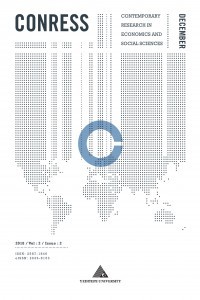Türkiye’de Suriyeli Mültecilere Karşı Kamusal Tutumların Neden ve Sonuçları
Suriyeli mülteciler, tehdit algısı, önyargı, duygular, gruplar arası ilişkiler
Causes and Consequences of Public Attitudes toward Syrian Refugees in Turkey
Syrian refugees, perceived threat, prejudice, emotions, intergroup relations,
___
- Allport, G. W. (1954). The nature of prejudice. Cambridge: Addison-Wesley.
- Bahcekapili, C., & Cetin, B. (2015). The Impacts of Forced Migration on Regional Economies: The Case of Syrian Refugees in Turkey. International Business Research, 8(9), 1–15.
- Brader, T., & Marcus, G. E. (2013). Emotion and political psychology. In L. Huddy, D. O. Sears, & J. S. Levy (Eds.), The Oxford Handbook of Political Psychology (2nd ed., pp. 165–204). Oxford: Oxford University Press.
- Del Carpio, X. V., & Wagner, M. C. (2015). The impact of Syrian refugees on the Turkish labor market (Policy Research Working Paper No. WPS 7402). Washington, D.C.: World Bank Group. Retrieved from http://documents.worldbank.org/curated/en/505471468194980180/The-impact-of-Syrians-refugees-on-the-Turkish-labor-market
- Devine, P. G., Evett, S. R., & Vasquez-Suson, K. A. (1996). Exploring the interpersonal dynamics of intergroup contact. In R. M. Sorrentino & E. T. Higgins (Eds.), Handbook of motivation and cognition, Vol. 3: The interpersonal context (pp. 423–464). New York: Guilford Press.
- Erdoğan, M. M. (2015). Türkiye’deki Suriyeliler: toplumsal kabul ve uyum. İstanbul: İstanbul Bilgi Üniversitesi Yayınları.
- Erişen, C. (2013). Emotions as a determinant in Turkish political behavior. Turkish Studies, 14(1), 115–135.
- Erişen, C. (2015). Emotions, social networks and Turkish political attitudes on the Syria crisis. Southeast European and Black Sea Studies, 15(1), 1–18.
- Erişen, C., & Kentmen-Cin, C. (2017). Tolerance and perceived threat toward Muslim immigrants in Germany and the Netherlands. European Union Politics, 18(1), 73–97.
- Erişen, C., Lodge, M., & Taber, C. S. (2014). Affective contagion in effortful political thinking. Political Psychology, 35(2), 187–206.
- Fisunoğlu, A., & Sert, D. Ş. (2018). Refugees and Elections: The Effects of Syrians on Voting Behavior in Turkey. International Migration. https://doi.org/10.1111/imig.12455
- Getmansky, A., Sınmazdemir, T., & Zeitzoff, T. (2018). Refugees, xenophobia, and domestic conflict: Evidence from a survey experiment in Turkey. Journal of Peace Research, 1–17. https://doi.org/10.1177/0022343317748719
- Hardin, R. (1995). One for all: The logic of group conflict. Princeton: Princeton University Press.
- Marcus, G. E., Neuman, W. R., & MacKuen, M. (2000). Affective intelligence and political judgment. Chicago, IL: University of Chicago Press.
- Matland, R., Erişen, C., Clifford, S., & Wendell, D. (2018). How Disgust Sensitivity Impacts Support for Immigration Policy across Four Nations: United States, Norway, Sweden, and Turkey. Presented at the Annual meeting of Midwest Political Science Association, Chicago.
- Miller, D. A., Smith, E. R., & Mackie, D. M. (2004). Effects of intergroup contact and political predispositions on prejudice: Role of intergroup emotions. Group Processes & Intergroup Relations, 7(3), 221–237.
- Pettigrew, T. F. (1998). Intergroup contact theory. Annual Review of Psychology, 49(1), 65–85. Admissions & Arrivals. (n.d.). Retrieved May 1, 2018, from http://www.wrapsnet.org/admissions-and-arrivals/
- Tajfel, H. (Ed.). (1978). Differentiation between social groups: Studies in the social psychology of intergroup relations. Oxford: Academic Press.
- Tajfel, H., & Turner, J. C. (1979). An Integrative Theory of Intergroup Conflict. In W. G. Austin & S. Worchel (Eds.), The Social psychology of intergroup relations (pp. 33–47). Monterey, California: Brooks/Cole.
- Tumen, S. (2016). The economic impact of Syrian Refugees on host countries: Quasi-Experimental evidence from Turkey. American Economic Review, 106(5), 456–60.
- UNHCR. (2018). Situation Syria Regional Refugee Response. Retrieved May 1, 2018, from https://data2.unhcr.org/en/situations/syria
- Vasilopoulos, P., Marcus, G. E., & Foucault, M. (2017). Emotional responses to the Charlie Hebdo attacks: Addressing the authoritarianism puzzle. Political Psychology, 39(3), 557–575. https://doi.org/10.1111/pops.12439
- Vasilopoulou, S., & Wagner, M. (2017). Fear, anger and enthusiasm about the European Union: Effects of emotional reactions on public preferences towards European integration. European Union Politics, 18(3), 382–405.
- #WelcomeRefugees: Key figures. (2017, January 29). Retrieved January 5, 2018, from https://www.canada.ca/en/immigration-refugees-citizenship/services/refugees/welcome-syrian-refugees/key-figures.html
- ISSN: 2587-1846
- Başlangıç: 2017
- Yayıncı: Yeditepe Üniversitesi
Osmanlı ve Rus İmparatorluklarında Doğrudan Yabancı Yatırımlar
V. Necla GEYİKDAĞI, M. Yaşar GEYİKDAĞI
Enerji Bağımlılığı ve Ekonomik Büyüme
Bağımsız Denetimde Mesleki Yargı Kullanımına Etki Eden Faktörler: Türkiye Örneği
Elçin ŞİŞMANOĞLU, Dursun ARIKBOĞA
Türkiye’de Suriyeli Mültecilere Karşı Kamusal Tutumların Neden ve Sonuçları
Türk Siyasetinde Ordu ve 15-16 Temmuz Darbe Girişimi
Kimlik ve Kadın: İran İslam Cumhuriyeti Anayasası’nda Kadının Statüsü
